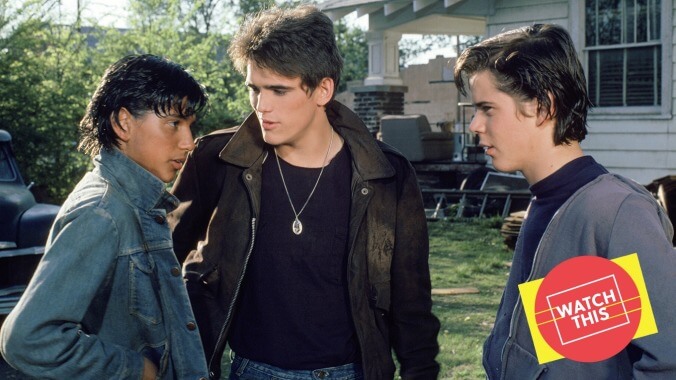Francis Ford Coppola’s The Outsiders brought the definitive YA novel to the screen

Watch This offers movie recommendations inspired by new releases, premieres, current events, or occasionally just our own inscrutable whims. This week: The teen superhero movie New Mutants, from Fault In Our Stars director Josh Boone, has been postponed again. In its absence, we’re looking at YA adaptations.
The Outsiders (1983)
The Outsiders is the quintessential young adult novel. Not only did it help establish the genre, it was written by a teenager. “I was flunking a writing class while I was writing it. It was like The Outsiders ate my homework,” author Susan Eloise (S.E.) Hinton told The A.V. Club in 2017. The novel, about the warring factions in Hinton’s Oklahoma high school, was published primarily for a teen audience in 1967. The rest is history for the multitudes of young people who immediately gravitated toward it.
Naturally, translating this beloved volume into a film would be a tall order for anyone. Francis Ford Coppola was convinced by an apparently persuasive letter he received from “librarian Jo Ellen Misakian and the students of The Lone Star School in Fresno, California” (he dedicated the film to them). After the success of the first two Godfather movies and Apocalypse Now, the director’s career had hit a major pothole with the failed 1981 musical One From The Heart. He looked at The Outsiders as a bit of an escape. “I used to be a great camp counselor, and the idea of being with half a dozen kids in the country and making a movie seemed like being a camp counselor again. It would be a breath of fresh air. I’d forget my troubles and have some laughs again,” he told the The New York Times in 1983.
That sense of golden nostalgia is present in almost every frame of The Outsiders. Coppola was already familiar with the subject matter: rival gangs (here, the high-end South Side Socs versus the less-well-off Greasers), the associated rules (no one brings a knife to a fair fight), and most significantly, the importance of family loyalty, even among people you’re not related to. The three Curtis brothers (Patrick Swayze as Darrel, Rob Lowe as Sodapop, C. Thomas Howell as Ponyboy) make up the heart of the Greaser gang, but their pals Johnny (Ralph Macchio), Dallas (Matt Dillon), Two-Bit (Emilio Estevez), and Steve (Tom Cruise) are closer to them, and each other, than their own families. They live a kind of idyllic, Lost Boys lifestyle, filled with wisecracks, candy bars, and arm-wrestling.
The reasons for the rivalry between the Socs and the Greasers are unclear and insufficient: territory, financial inequality, the straight-up boredom of growing up in a remote area of Oklahoma. When one scuffle ends in tragedy, the movie shifts its focus to Dallas, Ponyboy, and Johnny. The latter two are the group’s youngest, most compassionate members, and still idealistic, while the older Dallas is a hardened ex-convict, determined to save them from a similar fate. Coppola plays up that idealism in numerous shots of lustrous landscapes at dusk, underlining a conversation between Ponyboy and Cherry Valance (a Soc played by Diane Lane) about how kids on both sides of town watch the sunset from wherever they are.
In Coppola’s young cast, the accents are shaky, as no one seems able to hang onto a Southern twang for an entire scene. Dillon’s Dallas is a bit overblown; lines like his “Do it for Johnny!” and “Be tough like me and you don’t get hurt” became iconic, but not necessarily in a good way. Still, Dillon makes an impressive commitment to the criminal you can’t help but root for, a boy who might have had an amazing life under a different fate. Same with Macchio’s Johnny, who remains soft-hearted despite circumstances that would break a lesser spirit.
Even at this early stage of their respective careers, the young actors boasted impressive star power: All the members of the Greaser gang, as well as Lane, would eventually play leads in their own movies. Coppola’s father, Carmine, wrote the melodramatically epic soundtrack, which at times resembles strains from the similarly themed West Side Story. Like that film, The Outsiders culminates in one final fight, which Coppola sets in a rainstorm. By the end, all the boys are covered in mud, and it’s nearly impossible to tell the Greasers and Socs apart, highlighting the futility of their endless rivalry.
Of course, the best-remembered line is Johnny’s “Stay gold, Ponyboy,” based on a Robert Frost poem. Coppola apparently took that line to heart, stressing the beauty of the gang’s youth, their fragile lightheartedness, and unabashed affection for each other. In The Outsiders, the bond between the Greasers stands out as the real gold; they weren’t outsiders as long as they had each other.
Availability: The Outsiders is available to rent or purchase from Amazon Prime, Google Play, iTunes, YouTube, and VUDU.